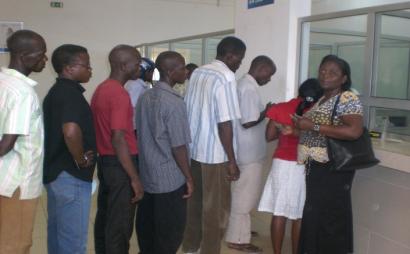Seasonal workers report that they appreciated receiving their payments in a timely fashion without having to spend too much time away from their work to receive their payment, while PMI’s implementing partner notes that the payment process for seasonal workers is now more organized, streamlined, and secure.

Seasonal IRS campaign workers wait in line to receive their payments at Ecobank in Natitingou, Benin. Source: AIRS Benin
The President’s Malaria Initiative has supported an indoor residual spraying (IRS) program in Benin since 2008. The program employs a large number of seasonal staff to complete a variety of activities that range from spraying houses with insecticides, to fixing spray pumps, to guarding storerooms used during IRS campaigns. In 2012 alone, the program employed over 780 individuals for the IRS campaign in the Atacora Region of Benin. In previous years, payment of these seasonal IRS campaign workers had posed a number of challenges for multiple reasons, including:
- Seasonal workers often come from rural communities and do not have bank accounts for receiving their payments;
- During IRS campaigns, some seasonal workers – especially spray operators– can be difficult to locate since they move from one community to another;
- There are considerable security risks in Atacora Region associated with program staff transporting large amounts of cash to pay seasonal workers; and
- Traveling within Atacora Region to find seasonal workers and pay them requires significant resources, including program staff time and transport/fuel costs.
In 2012, to alleviate these difficulties, PMI’s IRS implementing partner developed a partnership with Ecobank, a local bank in Benin. For a small fee, Ecobank agreed to pay the seasonal workers on behalf of PMI. PMI provided a badge and photo identification to each seasonal worker to ensure that only IRS campaign workers could receive payment from the bank. All photo identification was signed by both the worker and his/her supervisor to confirm the workers’ identity.
Together with Ecobank, PMI developed a payment schedule for the seasonal workers. Two days before payday, PMI’s implementing partner transferred funds to Ecobank to cover the payments for seasonal workers. On payday, PMI worked with the bank to ensure that the logistics for the payment process went smoothly. This included, for example, providing buses to take the workers to Ecobank locations in several towns of Atacora Region. A separate counter at the bank was designated specifically for the seasonal workers and 12 seasonal workers were paid at a time.
Ecobank was responsible for recordkeeping and carefully tracked which employees were paid and how much was disbursed. Employees were required to present their photo identification and payment was based on their position and allotted number of work days. Individuals who could not produce their spray campaign identification or whose name or face did not match the identification were refused payment.
The partnership with Ecobank has proved successful. Seasonal workers report that they appreciated receiving their payments in a timely fashion without having to spend too much time away from their work to receive their payment, while PMI’s implementing partner notes that the payment process for seasonal workers is now more organized, streamlined, and secure – a significant improvement to a process that was previously challenging to implement.
